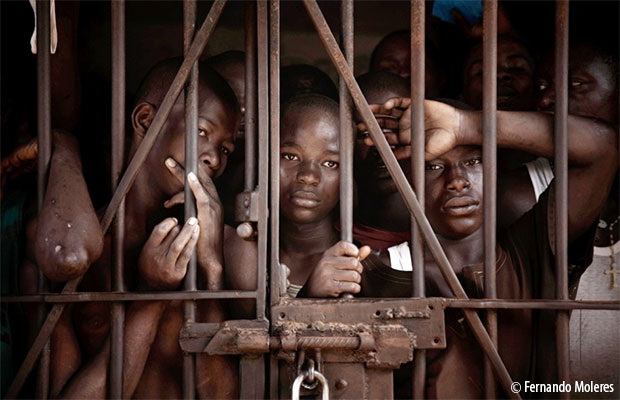
Redemption from “Hell on Earth”
At Pademba Road Prison in Freetown, Sierra Leone, more than 1,800 young men cram into a dark, filthy space designed for just 300. If they’re hungry, they must wait for their single daily meal of cassava leaves and rice. If they’re thirsty, they may not find relief. Far too often, water is so scarce that they don’t receive their meager ration of about a cup. Sanitation is virtually nonexistent and health care is only a dream. It’s no wonder that this place is known as “Hell on Earth.”
“I came away convinced that many are aware they will die in the most inhumane prison in the world, despite their young age,” says Alberto Lόpez, a journalist with the Salesian Missions office in Madrid, Spain. Mr. Lόpez gained admission to the prison as a guest of Father Jorge Crisafulli, a Salesian missionary who, in his role at Don Bosco Fambul, ministers to 250 of these inmates each week. Prison authorities forbid any media coverage of the appalling conditions at their facility. Mr. Lόpez was forced to visit under the guise of an international benefactor in order to avoid the scrutiny that would prevent telling the inmates’ stories.
And their stories are heartbreaking. Many of them were arrested by police under suspicion for being delinquent — when their only “crime” was to seek better opportunities in the city after a devastating civil war wreaked havoc on their lives and livelihoods. Suddenly, trying to survive on the streets while searching for work became a punishable “offense.”
“All too often, minors are unlawfully detained, or arrested for petty offenses, and imprisoned indefinitely with no legal recourse,” says Brother Lothar Wagner, director of Don Bosco Fambul. “Worse, many of them have no family to advocate for their fair treatment, or even to visit and offer moral support.”
Salesian missionaries have been serving in Sierra Leone since 2001, when they began working to rehabilitate former child soldiers. In the years since, the Salesian program called Don Bosco Fambul, has become one of the country’s leading child welfare organizations — offering food, clothing, shelter, educational opportunities and family reunification counseling. In 2014, at the request of Sierra Leone’s government, Don Bosco Fambul opened a special shelter to care for hundreds of Ebola orphans, and led efforts to educate the general public about preventing the spread of disease. This latest prison initiative, launched in 2014 in collaboration with Catholic Charities and the Sierra Leone Prisons Service, represents a logical addition to the Salesians’ services.
“Because the vast majority of these prisoners are destitute, they are unable to access the legal services they need to ensure their rights are upheld,” says Bro. Lothar. Noting that some boys and young men have languished for years at Pademba Road without having received an official sentence, or even been formally charged with a crime, he explains: “The Legal Support Project provides the most disadvantaged inmates critical representation as we work to secure their release.” While visiting with prisoners, Salesian missionaries also provide food and water each day to help ease their physical suffering.
Don Bosco Fambul has also established a dedicated counseling center within the prison, where inmates can access mental health services, stress therapy, medical assistance and reintegration training to ensure they are prepared to rejoin society upon their release. Salesian missionaries also hope to open an education and skills training center, where prisoners can learn trades such as masonry, plumbing and welding. Younger inmates may also complete primary or secondary school. This program, says Bro. Lothar, will help keep them from returning to the streets by equipping inmates with the knowledge and tools they need to find long-term work when they are released.
“There is much work to do,” says Bro. Lothar, “but we are committed to the cause. These young people deserve nothing less.”
In the meantime, amid their unspeakable suffering and resignation, inmates express deep gratitude to the Salesians. Their presence is “a little bit of heaven in the hell of that prison,” observes Mr. Lόpez.
Our mission eases suffering and shows mercy. What’s your mission?

